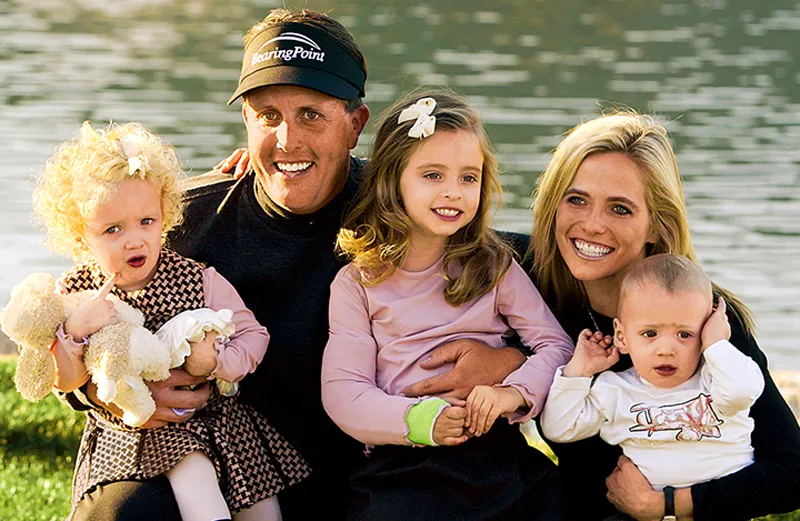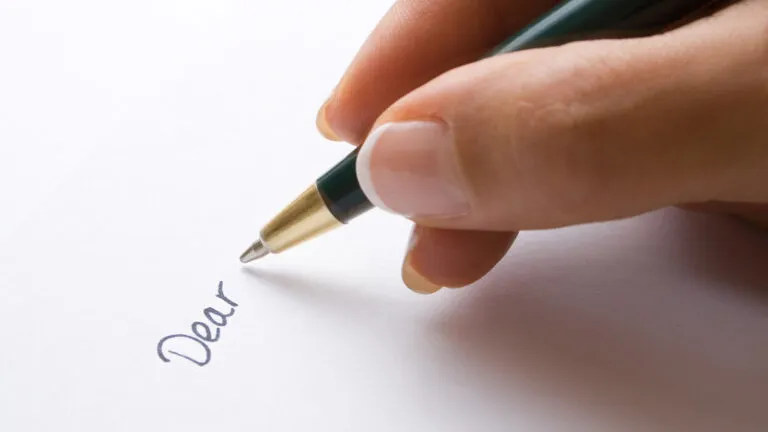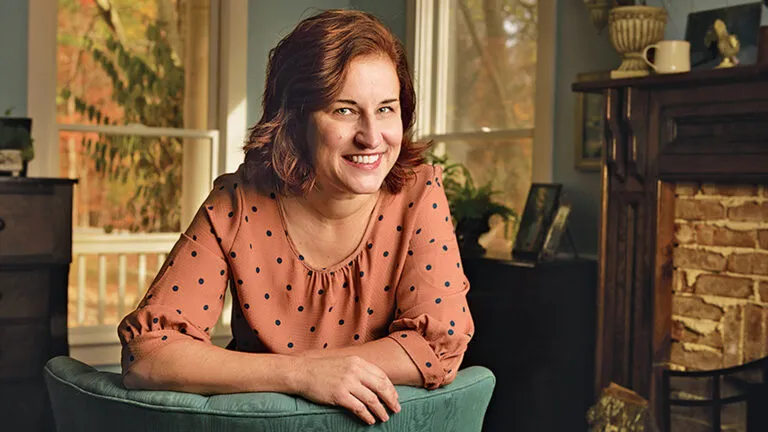To celebrate Phil Mickelson’s thrilling comeback victory in the 2013 British Open—he came from five back at the beginning of play on the tourney’s final day to win by three strokes—we bring you this Guideposts Classic, in which Mickelson recalls the occasion in 1999 when he resolved that golf would take second place to his responsibilities as a husband and father.
My caddie slid the black pager into his pocket. It was one of those models that vibrate, like the type the hostess sometimes gives you when you’re waiting for a table at a crowded restaurant. Only one person—my wife, Amy—knew the code.
“If that pager goes off, you tell me,” I instructed my caddie as we walked from the practice range through the crowd to the first hole.
I was about to tee off at North Carolina’s Pinehurst Golf Club in the final round of the 1999 U.S. Open, one of golf’s most prestigious tournaments. I had never won the Open—had never won any of golf’s four major events—though I had come tantalizingly close. Now I trailed by a stroke.
But a message on the pager would mean just one thing: Amy had gone into labor with our first child. I was determined to fly back to Arizona to be with her. In fact, I had a private jet standing by.
“If she calls,” I said to the caddie as he handed me my driver, “I’m out of here. I don’t care if I’m on the fourteenth hole with a five-stroke lead.”
My caddie looked at me like I was nuts. Payne Stewart, who was in first place and with whom I was paired that day, shook his head. They didn’t understand what this baby meant to Amy and me. More than golf. More than anything.
We’d been trying to have a child for three years. Doctors told us we might not be able to. Family was everything to Amy and me. We were both brought up to believe that raising children would be the most important work of our lives.
We married in 1996 and honeymooned in Hawaii. We lolled on the beach, imagining the size of our future family. We had a small difference of opinion.
“I want two kids,” I said.
“I’m hoping for at least eight,” Amy said. She grew up in Provo, Utah, on a cul-de-sac with eight houses—and 45 kids. Three were her siblings. “I’m just used to having a lot of children around,” she said.
We compromised that day. We decided to stop at three. Well, maybe four.
If only.
Over the next couple of years we tried and prayed, tried and prayed some more. Sometimes I’d watch Amy while she slept and think, Lord, can’t you see what a wonderful mother she’d make?
After three years we had just about given up. Though we loved each other as much as two people could, we felt somehow incomplete. We talked about adoption. “I want a child so badly,” I said.
That winter we returned to Hawaii for a friend’s wedding. Maybe it was something in the sultry, tropical air, but not long after, Amy shared the biggest news of our lives. She was pregnant at last.
Amy and I read every baby book we could find. We wanted to be ready for anything and everything. We knew from tests that our baby would be a girl. We decided to name her Amanda.
I went back on the road, back to the professional golf tour. Amy traveled with me much of the time, but the weeks apart were difficult. I’d call at night after finishing a round. “I felt Amanda kicking today,” she’d say. “It felt like someone was playing the bass drum inside me.”
Afterward, I’d sit back on my hotel bed and think of my own parents and how they raised my brother and sister and me. They were always there for us. Mostly, they taught us that goodness comes to those who work hard and have strong values, and that’s what families are for. To instill those values.
Dad was very patient with us; never got upset, never yelled. He managed our Little League and soccer teams. He was a good teacher. He’d show us a skill—catching a ball, solving a math problem—and then give us time to learn it. He was always willing to help, but only after he knew we’d done everything to help ourselves.
My mom was very competitive. She was captain of her high school basketball team. She loved to win, and for her children to win. But it was never everything to her. Doing your best and doing what’s right always came first.
Most of all, I watched how my parents treated each other. They never argued in front of us, and were always supportive. My siblings and I knew how much they loved us, and each other. “I just want to follow their example,” I told Amy. “I want to do for our children what my parents did for me.”
We already knew Amanda’s due date: about two weeks after the U.S. Open.
“What if she comes early?” Amy asked.
It’s funny. When I was still in college, a great golfer named Larry Mize made headlines when he announced he was skipping the Masters—another of golf’s major tournaments—so as not to miss the birth of his child.
I remember shaking my head and thinking, It’s the Masters, man, what are you doing? It wasn’t until Amy finally got pregnant that I was able to understand Larry’s feelings. Totally.
“Honey, I’ll do exactly what Larry did,” I said.
The day before I was to leave Arizona for the Open, Amy and I went to see her doctor. “Nothing to worry about,” he assured me. “Get on the plane.” But looking at Amy’s swollen belly, I didn’t find it so easy.
“Amanda and I will wait for you,” Amy promised.
“I’m going to come home with the U.S. Open trophy, we’re going to have the baby and it’s going to be the best week of our lives,” I said. “I’m not leaving you like this just so I can finish in the top ten.”
I had a reputation as one of the world’s greatest golfers. But I had another reputation too, a not so great one. The media called me the best player who had never won one of the sport’s major events.
I knew a lot of great players had gone far longer without winning a big one. I was still young and had plenty of time. But it was getting to me, all the talk every time I got within striking distance of one of those titles. I wanted to put that criticism to rest.
During the first three days of the four-round U.S. Open, I had let nothing interfere with my golf. Nights were another story. I shared a house with Fred Couples, another top golfer, and our caddies. We would watch a game on TV, then Fred would go to bed and I’d call Amy.
“I’m doing fine, Phil,” she kept saying.
At the end of the third round, I was just one stroke off the lead. I felt great. What I didn’t know—what Amy didn’t tell me—was that after we talked that night she went to the hospital. The baby, it seemed, was on the way. But Amy was so selfless, she didn’t want me to leave the tournament.
She told her doctor, “I want to wait for Phil. Please give me something to slow the contractions.” It worked. She was home Sunday, ready to watch me, oblivious to what was going on back in Arizona, go for the win on TV.
I stepped to the first tee. Payne and my caddie looked on. The pager made a little bulge in my caddie’s pocket. I half wondered if I’d be able to see it vibrate.
I took a deep breath and flushed everything but golf from my mind. I addressed the ball and boomed a long drive straight down the fairway. I was off to a good round.
So was Payne. The whole way we played neck and neck. On the sixteenth hole Payne made a long, winding 25-footer. Payne and I were tied. He birdied the seventeenth to pull ahead and sank an improbable 18-foot putt to clinch the win on the final hole. The crowd roared and I tipped my hat to Payne.
Payne walked over and hugged me. “Being a father is greater than anything you can imagine, Phil,” he said. “Greater than this. I’m so happy for you and Amy.”
That night I was on the plane, headed home to Arizona. I found myself thinking about Larry Mize. Back then nothing was more important to me than winning. I was like my mom, but without her healthy perspective. Then I fell in love with Amy and it changed me.
Thank you, God, for giving Amy to me, and for the baby you are about to give us. I didn’t think another minute about my loss.
Fans still remember that final round of the 1999 U.S. Open. They’ll come up to me and say, “If only Payne’s putt had rimmed out, you would have tied and gone into a playoff. You could have won.”
I have to smile. Amy gave birth to our daughter Amanda the next day, the day our playoff would have been held. Heck, I would have packed up my clubs the minute the pager went off. Payne would have won anyway!
And God knows, I won something much bigger.
Download your FREE ebook, Rediscover the Power of Positive Thinking, with Norman Vincent Peale





